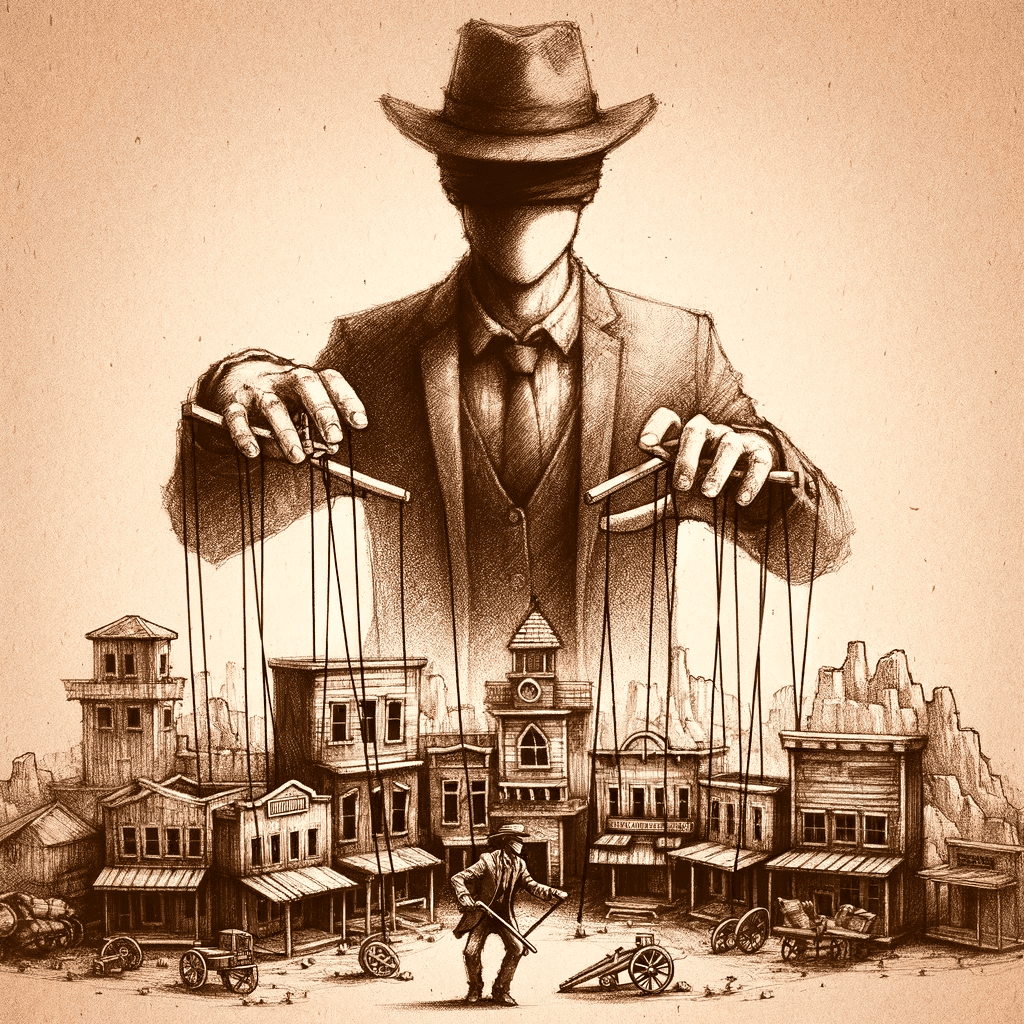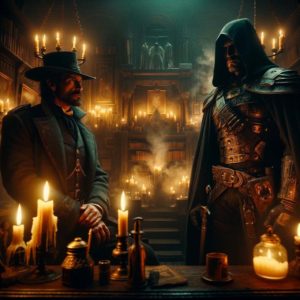
“It is decided then,” Giancarlo said, his voice resonant with conviction. “We shall build a vessel—a sanctuary upon the waves that will carry us to America.”
Joseph’s brow furrowed at this, a display that his unemotional English face was not used to. “To flee is not in our nature,” he countered, his stance rigid against the flickering flames. “Our roots are here; our battles waged on this very soil. We cannot simply abandon our heritage.”
“But we preserve our heritage by surviving,” Isabela, Spain’s representee chimed in, her voice rising above the murmurs. “America offers us a canvas blank and vast—a place to practice our arts without fear of pyre or gallows.”
Jean-Luc stepped forward from the edge of the circle where he had been observing, silent until now. The very earth seemed to still at his presence. He was not just a captain; he was a legend. The whispers about him stretched from the harbors of Marseille to the hidden coves of Corsica—tales of his daring escapes from English privateers and his uncanny ability to navigate through storms as if he conversed with the winds themselves.
They said he once sailed through a tempest that churned like Hades’ wrath, his ship, The Libertine, a lone speck against Neptune’s fury. When dawn broke, The Libertine emerged unscathed, her sails full and proud as if blessed by Poseidon himself. That day solidified Jean-Luc’s reputation—not just as a navigator but as a protector of those who dwelt in shadows.
The witches of old had whispered his name in reverence since that fateful voyage when he smuggled a coven out of England before they could be caught by witch hunters. He delivered them to safety under cover of darkness and storm, asking for nothing but their blessing in return. From then on, they called him “The Storm Whisperer,” a hero cloaked in salt and mystery.
Now here he stood among them, an embodiment of courage and hope. His eyes gleamed with purpose as he spoke.
“My friends,” Jean-Luc began, his voice carrying both warmth and authority. “I have sailed many seas and have seen both humanity’s darkness and light. The New World is not without its dangers—of this we can be certain—but it also holds promise.”
He paced before them slowly, boots crunching softly on the forest floor. “We are united by our quest for freedom to live and practice our beliefs without fear. I ask you now—not as Englishmen or Spaniards or Italians—but as kindred spirits: Will we let fear anchor us here where we wither? Or shall we chart a course together towards hope?”
His words hung in the air like mist over water. A silence fell over the group as they contemplated not just his words but the essence behind them—a call for unity in their diversity.
“It is one thing to speak of journeys,” Joseph finally spoke up again. “It is another to lead one fraught with unknowns.”
Jean-Luc turned to him with a nod of acknowledgment. “True,” he conceded. “But consider this: I have navigated more than just oceans—I have navigated us through perils unseen.” His gaze swept over those gathered around him. “And I swear by all that I hold sacred that I will guide us safely to these new shores.”
Murmurs rippled through the assembly like leaves rustling in anticipation before a storm.
“I’ve seen him command winds,” whispered on witch to another beside her.
“And I’ve heard tell of how he reads stars as if they speak directly to him,” another murmured back.
A collective breath was drawn then released; it seemed an agreement formed not just in words but in shared belief—a covenant sealed by mutual trust.
Jean-Luc looked out at their faces bathed in firelight—their features carved from histories both bright and dark—and saw resolve reflected back at him.
England’s objection cut through the gathering like a cold gale from the north. “This plan reeks of desperation,” Joseph argued vehemently. “Our place is here where our ancestors laid down their lives for our right to exist in secret. To leave is to concede defeat.”
“We do not concede defeat,” Mireille retorted, her gaze unwavering as she faced Joseph across the firelit divide. “We ensure that their sacrifices were not in vain by living to fight another day.”
Joseph’s face, ruddy from the biting cold and the fire’s erratic glow, contorted with indignation as the assembly reached its conclusion. The very notion that they would abandon their ancestral soil for a dream across the ocean was anathema to him.
“Abandon our lands? Our history?” he spat, his voice echoing through the trees like a winter gale. “You would turn tail at the first sign of hardship, flee like cowards to a world unknown and untamed?”
Mireille stepped forward, her posture betraying none of the trepidation that quivered in her heart. “We do not flee from hardship,” she countered with measured calm. “We seek a haven where our practices might flourish. In England, you may hold sway over your covens, but not all possess such luxury.”
Joseph’s eyes narrowed at Mireille, and he took a step closer to her. “Luxury?” he sneered. “You think it luxury to stand fast against persecution? To uphold our traditions where they were birthed?”
His words were like flint against steel, sparking ire in others who shared his sentiment. Yet many more among them had seen their kin perish in flames or hang from gallows—they understood that survival was paramount if their ways were to endure.
Jean-Luc raised his hand, drawing the assembly’s attention once more. “We respect your decision to remain, Joseph,” he said with an authority that stilled the murmurs around them. “But let us not be divided by choices made for survival. England may stand resolute, but we seek other paths.”
Joseph scoffed at this diplomatic response, his scowl deepening into furrows upon his brow. “Paths?” he barked. “You speak of paths when you should speak of roots! Our power is drawn from these lands—from Stonehenge to the Scottish Highlands! You cannot simply transplant such ancient connections.” Joseph shook his head vehemently at their arguments, each word from his peers driving a wedge further between him and this audacious plan.
“Enough!” he roared suddenly, silencing all other voices as effectively as if he had snuffed out the fire before them. His eyes blazed with fury—an inferno that could not be quenched by reason or plea.
“You would rip out your very hearts in search of safety!” Joseph’s accusation hung heavy in the air as smoke from their fire mingled with frosty breaths.
“The comet above us signals change,” Alaric stated his thick Austrian accent, he continued calmly despite Joseph’s outburst. “Perhaps it is time we embrace what it portends.”
Joseph turned away from Alaric then; disgust etched into every line on his face as if Alaric had suggested they dance upon sacred graves.
“I and England, will have no part in this madness,” Joseph declared with finality that echoed like a death knell through Bohemia’s ancient forest.
Mireille reached out towards him but her hand hovered uncertainly in midair—knowing well that some chasms could not be bridged by touch or word alone.
The assembly watched in silence as Joseph stormed away from them—his cloak billowing behind him like a storm cloud retreating into darkness.
His departure left a palpable void among them—a stark reminder that unity was fragile when weighed against convictions held dear.
Jean-Luc observed Joseph’s retreat until he vanished into shadowed woods beyond their circle; only then did he address those who remained:
“Let us proceed then,” Jean-Luc intoned gravely, feeling both the weight and promise of their undertaking settle upon his shoulders like a mantle passed down through ages.
The occultists exchanged glances—some still clouded by doubt while others shone with determination undimmed by dissenting voices.
Their fates were now intertwined like threads destined for America’s loom—a new pattern waiting to be woven far from England’s steadfast shores.
Jean-Luc Moreau stood before them—a beacon amid their uncertainty—and offered clarity amidst chaos: “Let us cast lots then,” he proposed solemnly. “Let fate decide how many from each representation will be granted passage on this voyage towards hope.”
And so they did—casting runes and drawing marks upon parchment—deciding fairly who would go and who would stay to maintain their presence in Europe’s shadowed corners.
France was allotted nine spots, their expertise lying in alchemy and spirit conjuration—practices steeped in a history that traced back to medieval grimoires and secret societies that had thrived under royal patronage.
Spain was allotted eleven occultists, skilled in divination and elemental magic—a reflection of their country’s rich blend of Moorish and European mysticism that had survived centuries of turmoil.
Italy was to contribute seven to their number masters in enchantments and necromancy—a legacy of the Ancient Empire’s forgotten deities and rituals that whispered through time.
Prussia was to be represented by seven individuals, versed in rune casting and clairvoyance—a testament to their nation’s fascination with esoteric knowledge during its age of enlightenment.
The Balkans were to provide ten members to the voyage, each one a keeper of shamanic traditions and warding spells that had evolved within a crucible of cultural intersections.
From The Carpathians were to come seven—guardians of secrets that pertained to vampirism and protection against dark entities that were said to roam their enigmatic mountains.
Wales were to send five occultists who specialized in druidic practices and earth magic—a heritage as ancient as the hills that rose from their homeland.
Bulgaria were to contribute seven, practitioners of Thracian rites and blood magic—a lineage rumored to trace back to Orpheus himself.
Greece was allotted four spots, masters in Astrology, philosophy, and venerable celestial sorcery.
Scotland were to dispatch eleven, experts in weather manipulation and second sight—abilities honed amidst misty lochs and heather-clad highlands.
The Netherlands were allotted nine members to be skilled in alchemical transmutations and metaphysical engineering—a reflection of their country’s innovative spirit and mercantile prowess.
Austria was to be represented by six individuals proficient in astral projection and psychic defense—a legacy born from their position at the crossroads of Europe’s mystical currents.
The Ottoman Empire were to send ten occultists, each a master of elemental binding and talismanic craft—skills that had been passed down through generations since Byzantine times.
Bohemia’s contingent would consist of seven chosen ones, each a savant in the arcane disciplines of Astrology and Alchemy. Among them were adepts capable of breathing life into clay, masters in the esoteric art of golemancy.
Sweden were allotted seven members who were adept at seidr and galdr—forms of Norse magic that spoke to the ancient sagas woven into their cultural fabric.
From The Kamnik-Savinja Alps came nine—each one an expert in mountain magic and geomancy, disciplines that drew power from the very bones of the earth.
Ireland were to dispatch seven representatives versed in faerie lore and healing charms—a reflection of their land’s enduring belief in the ‘Good People’ and ancient Celtic traditions.
Denmark were allotted five members who were to be skilled in runic inscriptions and sea sorcery—an embodiment of their Viking ancestors’ connection with both land and ocean.
Portugal sent nine occultists adept at navigational magic and curse breaking—talents born from centuries spent exploring unknown waters and encountering foreign magics.
Finally, Russia was to contribute eight individuals who specialized in ice sorcery and spirit binding—an amalgamation of Slavic mythology fused with Siberian shamanism.
The King then addressed the gathering of the Grand Covens of Europe. The comet that had set their fates in motion now a fading scar upon the night sky, its light dimming as it whispered secrets only the heavens could comprehend.
“Esteemed representatives,” the King began, his voice echoing like a tolling bell through the silent woods, “the time has come to act upon our decision. I will commence the building of a ship—a vessel worthy of our great endeavor—in the port of Amsterdam. On Beltane next year, when fires light the skies and purify the land, our ship shall depart these shores.”
Murmurs rippled through the assembly as each occultist absorbed the weight of his words. The portents had been read, lots cast; their paths now lay charted by stars unseen.
“Return to your homelands,” he continued, “and prepare your chosen people. They must be strong of body and spirit—unfettered by illness or frailty. They are to be pioneers of a new world, bearers of our legacy. Decide among yourselves; time is both our ally and adversary.”
With a solemn nod, they acknowledged their monumental task—lives would change course by their hand, destinies rewritten by their will.
“You have until Beltane,” the Queen reminded them softly yet with an undertone that brooked no argument or delay. “Go forth and prepare—for destiny favors neither hesitation nor doubt.”





